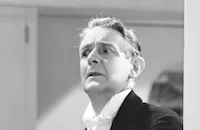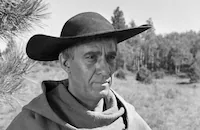The Snows of Kilimanjaro

Brief Synopsis
Cast & Crew
Henry King
Gregory Peck
Susan Hayward
Ava Gardner
Hildegarde Neff
Leo G. Carroll
Film Details
Technical Specs

Synopsis
In 1946, American writer Harry Street is on safari in Africa with his second wife Helen, when a scratch on his leg becomes infected and he falls seriously ill. In their camp near Mt. Kilimanjaro, Helen tends to Harry, a cynical, hard-drinking womanizer who has never hidden his contempt for her wealth and his reliance upon it. During their often caustic conversations, Harry tells Helen about his first love: When he is a teenager, Harry falls in love with a girl named Connie, but his uncle, Bill Swift, knowing that Harry wants to become a writer, advises him to end the relationship. The wordly Bill tells Harry that a good writer must place his search for the truth ahead of anything else, despite the pain and suffering it may cause. Back in the present, Harry insults Helen, and fed up, she goes to kill game. During her absence, Harry falls asleep and dreams of how he met Cynthia Green, the love of his life: In the 1920s, Harry is a young man living a bohemian life in Paris. One night, he meets the stunning, mysterious Cynthia in a jazz club and immediately falls in love with her. Soon, the couple are married, and despite their poverty, Harry enjoys life in their colorful neighborhood. After Harry's first novel is published, he fulfills his lifelong dream of going on a hunting safari in Africa, and although Cynthia is squeamish about killing, she accompanies him. On the evening that Harry kills his first rhino, he ecstatically states that he wants to write about the joy of the hunt, and later, Cynthia confides in Johnson, their friend and guide, that she is pregnant. Although Cynthia wants the child, she fears that she will lose Harry, who would feel constricted by the responsibility. Johnson advises her to tell Harry, but later, in the city, when Harry states that he wants to travel to Madrid, Cynthia decides not to reveal her condition but obliquely suggest that she wants children. As Cynthia had feared, Harry reacts negatively, asserting that he wants children someday but that, for the present,his growth as a writer is more important than a family. Crushed, Cynthia deliberately throws herself down a flight of stairs and induces a miscarriage. Although Cynthia tells Harry that the fall was an accident, he reproaches her, and soon, an atmosphere of guilt and blame taints their relationship. In Madrid, Cynthia, torn between her love for Harry and her certainty that he resents her, leaves him for a flamenco dancer. Back in Africa, the feverish Harry awakens from his dream and again taunts Helen about the many women in his life. He tells his servant Molo about one, the Countess Liz: After a long string of affairs, Harry becomes engaged to the rich, icy Liz. Bill visits Harry and Liz at their home in the French Riviera, and there, Harry tells him that despite his fame, he feels he is wasting his talent on trifling works. Obtaining Cynthia's address, Harry writes to her, telling her that he once thought he saw her, but the woman he followed turned out to be Helen. Cynthia eventually replies, and when the jealous Liz tears up the letter, Harry leaves her and joins the Loyalist Army, who are fighting the Spanish Civil War. By chance, Harry finds Cynthia, an ambulance driver, just after she has been wounded during a battle. Harry and Cynthia forgive each other as he holds her, but she dies a few moments later. After years of wandering, Harry visits Bill in Paris, where he is gravely ill. Harry complains that he has destroyed his talent by writing only what is expected of him, and when Bill dies, his "legacy" to Harry is the riddle of the leopard who died atop Kilimanjaro, high above his normal hunting grounds. Wondering if Bill meant that he has lost his way, as the leopard must have, Harry gets drunk, and that night, again mistakes Helen for Cynthia. As Harry's reverie ends, he realizes that night has fallen and Helen has started their campfire. Although Helen claims that Harry has never forgiven her for not being Cynthia, he asserts that they both knew what they were getting when they married. Harry then states that he returned to Africa in order to recapture a time when he felt vital and capable of great writing, although he fears that he is now near death. Helen's pleas for Harry to hang on until Johnson returns with a doctor make him realize how much she loves him, and how much he has misjudged her. As the night wears on, Harry becomes delirious with fever, and Helen is forced to lance his abcessed wound. Guarding Harry until the early morning hours, Helen finally sleeps, and when she awakens, she chases off the lurking hyena that she believes symbolizes Harry's improaching death. Soon after, Johnson returns with an airplane, and Harry regains consciousness. Realizing that he is going to live, Harry gratefully embraces his wife.

Director
Henry King
Cast

Gregory Peck

Susan Hayward

Ava Gardner
Hildegarde Neff

Leo G. Carroll

Torin Thatcher
Ava Norring
Helene Stanley

Marcel Dalio
Vicente Gomez
Richard Allen

Leonard Carey
Paul Thompson
Emmett Smith
Victor Wood
Bert Breed
Agnes Laury
Monique Chantel
Janine Grandel
John Dodsworth
Charles Bates

Lisa Ferraday
Maya Van Horn
Ivan Lebedeff
Salvador Báguez
George Navarro

Martin Garralaga
George Davis
Julien Rivero
Edward Colmans
Elzie Emanuel
Amapola Del Vando
Ernest Brunner
Arthur Brunner
Benny Carter
Amanda Ambrose
James Davis
Maurice Brierre
Victor Desny
Andre Charlot
Pepi Lenzi
Bertil Unger
Constance Purdy
Ann Staunton
Cecil Weston
Arthur Dulac
Jay Loftlin
Wade Dumas
Tito Renaldo
Paul Fierro
Alphonse Martell
Olga Borget
John Roy
Jerry, A Hyena
Crew
Armando Agnini
Ben Bennett
Teresa Brachetto
Josephine Brown
Charles G. Clarke
Tom Connors
John Decuir
Leonard Doss
Walter Fitchman
Paul S. Fox
Bernard Freericks
Max Golden
Vicente Gomez
Eghiche Harout
Roger Heman
Bernard Herrmann
F. E. Johnston
Eddie Jones
Ray Kellogg
Lew Kunkel
Charles Lemaire
Thomas Little
Frank Lubin
William Maybery
Scotty Mcewen
Barbara Mclean
Alfred Newman
Ben Nye
Prince Modupe Paris
Jack Pennick
R. Penso
C. S. Ramsay-hill
Suzanne Ravisé
Casey Robinson
Ernest Rochety
Leon Shamroy
Robert Snody
Max Tay
Antonio Triana
Anthony Ugrin
Henry Weinberger
Lyle Wheeler
Saul Wurtzel
Darryl F. Zanuck

Film Details
Technical Specs

Award Nominations
Best Art Direction
Best Cinematography
Quotes
Trivia
Notes
The opening title cards of this film read: "Twentieth Century-Fox presents Gregory Peck, Susan Hayward, Ava Gardner in Ernest Hemingway's The Snows of Kilimanjaro." At the beginning of the film, a voice-over narrator quotes the opening of Hemingway's short story: "Kilimanjaro is a snow-covered mountain 19,710 feet high, and is said to be the highest mountain in Africa. Its western summit is called the Masai 'Ngàje Ngài,' the House of God. Close to the western summit there is the dried and frozen carcass of a leopard. No one has explained what the leopard was seeking at that altitude."
As noted by many reviewers, the character of "Harry Street" dies at the end of Hemingway's original story. According to information in the Twentieth Century-Fox Records of the Legal Department, located at the UCLA Arts-Special Collections Library, Hemingway first sold the rights to his short story to independent producer Mark Hellinger in 1947. Hellinger later restored the rights to Hemingway, and Twentieth Century-Fox bought the story for $125,000 in June 1948.
Humphrey Bogart, Richard Conte and Marlon Brando were mentioned by Hollywood Reporter news items as being under consideration for the role of Harry. Information in the Twentieth Century-Fox Produced Scripts Collection, also located at UCLA, adds that in July-August 1951, producer Darryl F. Zanuck was considering casting Dale Robertson as Harry. In July 1948, Los Angeles Times reported that Gene Tierney had been cast in the film. According to studio records, Anne Francis was originally cast as "Cynthia" but was replaced by Ava Gardner. According to modern sources, Hemingway himself suggested Gardner, while a 1991 Hollywood Reporter news item stated that Hedy Lamarr was also under consideration for the role. Gardner was borrowed from M-G-M for the production. Although studio records list both James Davis and Everett Brown as "Abdulla," studio publicty indicates that Davis played the role in the finished film. Hollywood Reporter news items include the following actors in the cast, although their appearance in the released film has not been confirmed: Thomas Licht, Edward Gimpell, Gay Gayle, Louis Tomei and The Hallelujah Singers.
As noted in contemporary sources, backgrounds for the film were shot in Paris, the French Riviera, Spain, Kenya, Tanzania and Nairobi. Studio records report that the bullfight sequences were taken from the 1941 Fox production Blood and Sand (see AFI Catalog of Feature Films, 1941-50). Studio records add that the version of the film released in Germany and Austria contained a sequence of Hildegarde Neff as "Countess Liz" singing "You Do Something to Me." In connection with publicity for the film's opening in Los Angeles, Gardner imprinted her hand-and footprints in cement in the forecourt of Grauman's Chinese Theatre on 21 October 1952.
According to the film's file in the MPAA/PCA Collection at the AMPAS Library, the PCA rejected the May 26, 1951 draft of the screenplay. In a June 1951 letter, PCA head Joseph I. Breen strongly objected to the portrayal of Harry as a thrice-divorced man [in early drafts, Harry married "Connie," "Cynthia," "Liz" and "Helen"], Cynthia's self-induced miscarriage and the suggestion that Liz was a lesbian who had an affair with her model "Beatrice." Harry's multiple marriages and Liz's lesbianism were dropped from subsequent drafts of the screenplay, although the PCA continued to demand that Cynthia lose her baby accidentally, rather than by throwing herself down the stairs. On August 1951, Breen again wrote to the studio, approving the self-induced miscarriage by noting that the script had been in development since 1948, before the March 1951 adoption of the PCA's rules prohibiting any depiction of abortion.
The film received Academy Award nominations for Best Cinematography (Color) and Best Art Direction (Color). Although the picture received mixed reviews, it was the third-highest grossing film of 1952, with a domestic box-office total of $6,600,000, according to a modern source. In May 1956, New York Times reported that the picture had been banned in India for "presenting 'disparaging' impressions of life in Africa." King, screenwriter Casey Robinson and Gregory Peck had previously worked together on another Hemingway adaptation, the 1947 UA release The Macomber Affair (see AFI Catalog of Feature Films, 1941-50). In 1957, King again directed Gardner in the Hemingway-based Twentieth Century-Fox release The Sun Also Rises (see below).

Miscellaneous Notes
Released in United States 1952
Released in United States 1952












